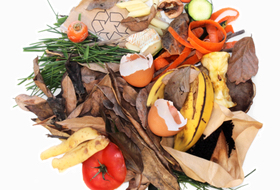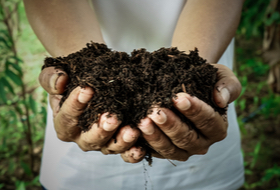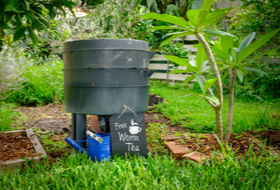Composting
Page updated on: 31/03/2025
Composting is a natural process that converts your kitchen and garden waste into a valuable nutrient rich food for your garden. Up to a third of your household waste can be composted at home, reducing the need for collection and further processing.
Did you know that composting at home for just one year can save global warming gases equivalent to all the CO2 your kettle produces annually, or your washing machine produces in three months?* (* Info source WRAP).
Benefits to composting include:
- If this waste is buried in landfill, air cannot get at it so it breaks down producing methane gas and contaminates ground water. This contributes to global warming, and means that vast sums of money have to be spent treating the ground water that leaches out of the landfill.
- Financial savings – The final product of home composting is a natural chemical free source of plant food, which will save on shopping for pre-packed compost and fertilisers.
- Most pre-packed compost contains peat, when this is taken from peat bogs it damages wildlife habitats.
- Home compost improves the texture and nutritional quality of your soil.
Composting is a way of speeding up the natural decay of organic matter, by creating the ideal conditions for small organisms to thrive. They love a moist environment with lots of air pockets, and just a teaspoon of soil contains about a billion organisms. In the initial stages bacteria and fungi eat their way through the softer waste, multiplying rapidly and generating heat up to app. 60°C that’s about the same temperature as a cup of tea. After 4-6 weeks the heap starts to cool down, at this point the larger bugs like beetles, worms and centipedes start to munch their way through the tougher materials.
Using a compost bin, it will take from 6-12 months to make your compost. The process is much slower in the winter months and if you have a lot of large woody material it can take longer, so it helps to break it up first.
We sell a 330 litre ‘Soil Saver’ bin with hatch. The bin dimensions are: Height 100cm - Diameter 80cm. The bin costs £14.50 including delivery. Please allow up to 10 working days for delivery after payment is processed. You don’t have to use a bin; an open heap will work but may be a bit slower and may need a larger amount of waste to work effectively.
You could also contain the waste using reclaimed wood e.g. old pallets to make a large box type structure – leaving the base and top open, cover with old carpet/polythene. Many people however opt for a plastic bin and these are widely available. Designs are similar; some have a hatch to get at the finished compost; some you have to lift the bin off the compost to get at it.
Tumbler type bins sit on a frame and can be agitated to aerate the mixture. They work much quicker than a regular bin, but are much more expensive.




